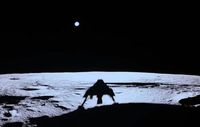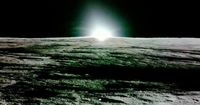The first private landing module on the Moon, Blue Ghost, launched by Firefly Aerospace, has successfully completed its mission. Operating on solar energy, Blue Ghost concluded its operations on March 16, 2025, when lunar night began at its landing site. Over the course of two Earth weeks, the module effectively performed tasks on the lunar surface, marking a significant milestone in space exploration.
Blue Ghost made its historic landing on March 2, 2025, on the basalt plain known as Mare Crisium. Notably, it became the second private module to ever land on the Moon, following Odysseus, which was launched by Intuitive Machines and touched down in February 2024. While Odysseus operated for a week, Blue Ghost doubled that duration, a testament to its design and functionality.
Firefly Aerospace considers the Blue Ghost mission a complete success. The team's head engineer, Will Kughan, emphasized the mission's thorough preparation, stating, “We tested every system of the landing module in live conditions and simulated every conceivable mission scenario to reach this point.” Such rigorous testing ensured that the module could withstand the challenges of space and operate smoothly on the Moon’s surface.
During its mission, Blue Ghost was equipped with ten scientific instruments from NASA, allowing it to capture valuable data. One of the most notable incidents occurred during a lunar eclipse on March 13-14, 2025, where the module observed the phenomenon, albeit appearing as a solar eclipse due to the specific angle at which it was positioned.
Throughout its operational time, Blue Ghost transmitted a remarkable 119 gigabytes of data back to Earth. This included 51 gigabytes of scientific information that will significantly contribute to ongoing lunar research. In its final hours, the module captured stunning imagery of a lunar sunset, providing NASA with crucial insights regarding the behavior of lunar dust influenced by solar factors, something that had intrigued scientists for decades.
Firefly reported that before sunset, the module was actively engaged in its scientific endeavors, stating, “After sunset, Blue Ghost operated for 5 hours during the lunar night, continuing to take pictures showing how dust behaves after sunset.” These observations are particularly relevant in light of recent studies indicating that deposits of water ice in lunar soil and regolith are more extensive than previously believed, as highlighted by an analysis from NASA's Lunar Reconnaissance Orbiter mission.
The success of Blue Ghost stands not just as an achievement for Firefly Aerospace, but as a landmark event in the realm of private space exploration. The increasing participation of private companies in space endeavors fuels innovation and competition, crucial drivers for the future of space travel. Firefly's accomplishment serves as a clear message that private entities can play a significant role in expanding humanity's reach beyond Earth.
As more companies set their sights on lunar exploration, the lessons learned from Blue Ghost’s mission will undoubtedly influence future projects. The data gathered during its two weeks on the lunar surface could help shape the development of more advanced navigational technologies and scientific instruments for upcoming missions.
The lunar landscape holds countless mysteries and potential resources, making it an attractive destination for further exploration. The unique observations made by Blue Ghost, particularly concerning lunar dust behavior, are poised to enhance not only our understanding of the Moon's environment but also play a crucial part in preparing for human missions to the Moon and beyond.
In conclusion, the successful completion of the Blue Ghost mission marks a new chapter in private space exploration. Firefly Aerospace's achievement not only provides valuable insights into lunar science but also highlights the growing significance of private companies in the field of space research and exploration. As efforts continue to engage in economic and scientific pursuits beyond our planet, Blue Ghost’s contributions will surely echo through future missions.





